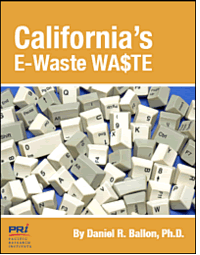The Pacific Research Institute (PRI), a free-market think tank based in California, found that California’s Electronic Waste Recycling Act (EWRA) is a waste of taxpayer dollars. In Fiscal Year 2007-2008, less than half of the facilities audited were in complete compliance with program rules, and the state has identified the program as “a high risk for fraudulent activities.” 
“California’s E-Waste Waste,” by Daniel Ballon, Ph.D., analyzes the history, performance, and consequences of EWRA and provides recommendations to reform e-waste recycling in the state.
In 2003 California passed EWRA, the nation’s first law for recycling electronic waste, by imposing a consumer-fee on the purchase of electronic devises. “Other states usually look to California as a leader in environmental reform,” said Dr. Ballon. “But in this case, California’s e-waste program is hardly a model worth emulating. EWRA is still the only e-waste recycling law that taxes consumers to create a government-run bureaucracy.”
Using data from the last six-years, Dr. Ballon found that under EWRA:
- Recycling a single electronic item requires 12 distinct transactions across three separate agencies.
- Expenses have grown nearly three times faster than revenue from 2004-2008.
- Yearly payments now exceed $150 million.
- The California Department of Finance has identified the program as a “high risk for fraudulent activities
.”
“Under the current system, recycling a piece of electronic waste depends on a complex maze of interactions with little accountability and loads of costs,” Dr. Ballon said. According to the study, EWRA contains no provisions to restrain rising fees and places this burden on consumers and taxpayers.
In order to correct the gamut of problems plaguing California’s wasteful e-waste program, PRI recommends market-driven reforms based on industry-led recycling solutions that can compete without the intrusion of a massive, taxpayer-backed recycling bureaucracy.
